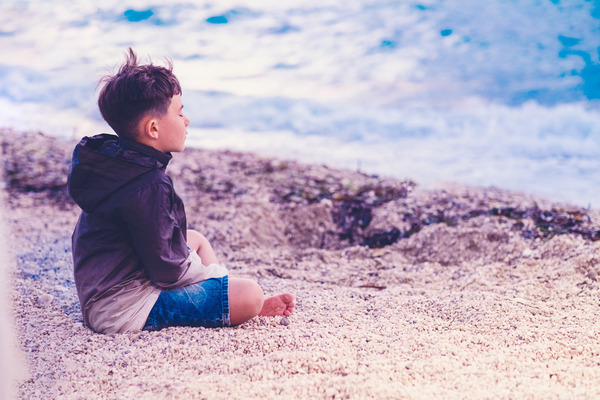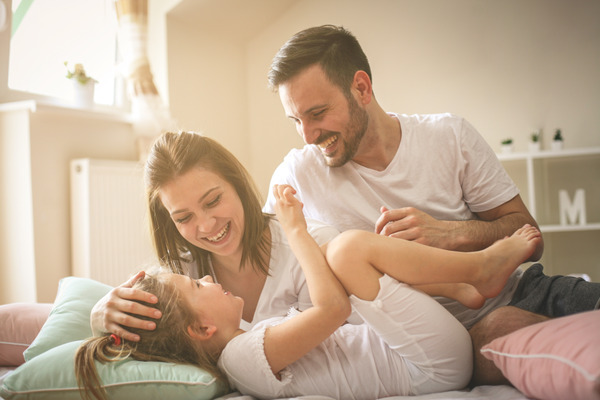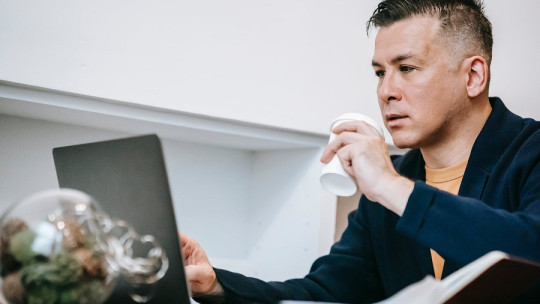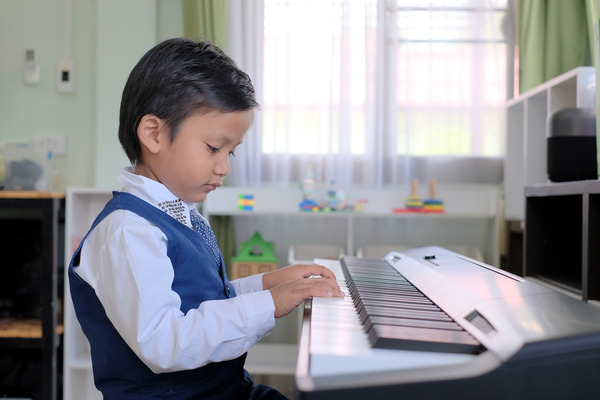What is mindfulness for children? We discover why it is interesting and what its benefits are for the little ones.
He mindfulness for children It is a technique of full attention or full awareness of what we do at each moment through meditation. It is valid and beneficial as a daily habit among the healthy population, both adults, children and young people, since it helps focus attention, relax and manage stress. It is also one of the most innovative therapies for the treatment of some psychological and medical disorders and pathologies, always in conjunction with other more specific therapies, due to its extensive benefits on both a physical and mental level. Let’s look at the basic points of this method and some Mindfulness games or mindfulness exercises for children.
What is mindfulness for children?
Mindfulness has flooded the field of Western psychology thanks to Jon Kabat-Zinn (a great reference in this field) and is an allied technique of Third Generation Psychological Therapies. However, this technique is actually part of classic Buddhist meditation although it currently does not involve religious overtones. It is a psychological practice composed of different meditation practices and useful psychological teachings for our psychological well-being. Furthermore, these meditation exercises can be applied to children to improve their concentration and attitude.
What is mindfulness for children like?
The word “mindfulness ” It is an English word that translates into Spanish as full consciousness or full attention. This technique has been defined in many ways, all of them referring to the development of the state of presence (being and being here and now), the development of a lucid and serene consciousness that lives in the present moment with equanimity and without judging what is happening. happening, and with acceptance, not resignation.
Furthermore, its practice is inextricably linked to the proper development of compassion. Some studies even suggest that to a large extent the effectiveness of mindfulness may be due to the fact that it generates mental states of self-compassion (understood as kindness and desire for happiness, not as pity) in which self-criticism is reduced and gentleness towards oneself is promoted. In this way, the mindfulness in early childhood education It can provide many benefits to children.
Ultimately, the mindfulness for children and adults It tries to develop attention or full awareness to the present moment and helps relaxation and manage stress Live here and now. Because, as the leading doctor and psychiatrist in this field, Vicente Simón, says:
“We live tied to multiple worries and with great stress that, in general, is not due to real situations, imaginary things that we ruminate on almost always generate stress. As if we were dreaming and didn’t realize it. It is a constant projection of the future that drags us”.
Benefits of mindfulness for children
If you have them for adults, the mindfulness for children It has multiple benefits. In general, people who begin to practice this emotion management technique tell us that they have a greater ability to regulate their stress, as well as a greater degree of well-being and serenity.
This ancient practice and psychological technique has attracted the attention of neuroscience and medicine for its impact on both physical and mental health. In this way, scientific research has revealed a long list of benefits that occur in general, in those people who they practice mindfulness , at different levels: physiological, immunological, emotional, behavioral, neurological, etc. More specifically, we can add that each person directs the benefit of meditation towards their own individual need for it.
Follow a mindfulness program for children or do mindfulness games For children, it can correct their bad attitude as well as help them become more aware of their inner selves and control their own emotions. So much so that through Mindfulness activities children can develop skills that they are not used to working on at school or at home, such as emotional intelligence. Focusing on children and adolescents, we can highlight the following benefits derived from this technique that scientific research has shown:
1. Greater peace of mind
Calmness is the first and immediate effect of mindfulness for children. When we are calm and our mind is serene, we can focus our attention on whatever is going to happen, which translates into better performance in the activity we are doing – whether it is managing an emotion, doing an exercise, attending to a explanation, watch a movie, plan an action, etc.-. By following a mindfulness program for children little ones can learn to put aside nervousness to perform certain tasks.
2. Improved care
The meditation or mindfulness for children It directly involves attention training, so this capacity will improve (as well as the ability to ignore distractions and not fall into distractions) and we will be more aware of what is happening inside and outside ourselves. These relaxation techniques for children increase children’s concentration, making them more focused on a task and avoiding multitasking.
3. Increased cognitive abilities
On the other hand, meditation improves other cognitive abilities such as the capacity for abstraction, logic, calculation, creativity, etc. Both doing some mindfulness activities and mindfulness games with children it provides notable mental and cognitive benefits in the little ones.
4. Reduce negative thoughts
He mindfulness for children It also reduces intrusive thoughts and rumination. Although it may seem that children do not usually think negatively, the reality is that our minds tend towards negativity from a very early age. For this reason, doing a guided relaxation for children or a mindfulness exercise for children can be very beneficial for learning to control the mind from a very early age.
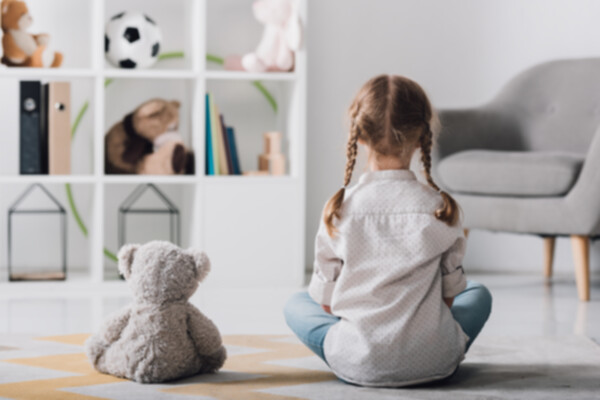
5. Control over impulsivity
The child who meditates and knows how to listen to his emotions will experience the latter in a useful, healthy and adaptive way, learning to respond instead of reacting, which implies less impulsiveness. It has been proven that performing mindfulness activities or mindfulness exercises for children Improves children’s control of impulsivity in various situations.
6. Frustration management
Mindfulness for children causes improvement in the management of frustrations, stress and anxiety since they will develop a greater capacity for acceptance of what happens to them. Learning to tolerate frustrations and failures can be beneficial for children’s learning. For this reason the children’s mindfulness It is a good technique to be able to tolerate mistakes and end up learning from them.
7. Increased self-esteem
It offers an increase in self-esteem, security and self-confidence. Next to its mindfulness games or mindfulness activities Children learn to value themselves from within and not to take the expressions of others for their own personal approval.
8. Self-knowledge
Mindfulness provides them with learning about their own limits and capabilities. Through this meditation for children, little ones can learn who they really are. In this way, the children’s mindfulness It provides tools to learn to know your inner self, vital learning to develop all your capabilities.
9. Facilitates forgiveness
Helps you learn to forgive yourself and others. The mindfulness techniques or mindfulness games They allow children to know the value of forgiveness and to do it in a more meaningful way before others.
10. Increased feeling of gratitude
Allows the development of gratitude, responsibility and love. The mindfulness activities for children How can guided relaxation for children end up allowing the little ones to value what surrounds them and learn to develop gratitude towards themselves and others.
On other levels such as the physiological benefits of mindfulness in children They are improvements in sleep, the immune system and blood pressure. In the academic field, the practice of mindfulness for children has shown an improvement in the performance, learning capacity and memory of the little ones.
At the behavioral level, there is less violence and a development of social skills , assertiveness and empathy. Finally, on a neurological level, some studies have revealed that practicing mindfulness techniques for children favors changes in the structure and functioning of the brain, such as helping to prevent the loss of volume that occurs in the cerebral gray matter with age, reducing the activation of the default neuronal network (network of neurons that remains active when our thinking is wandering) or that favors the activity of the prefrontal cortex, a brain area related to executive functions – behavioral inhibition, planning, attention, decision-making capacity, etc. -.
“In short, the child who practices mindfulness will lay the foundations for a healthier and more solid maturity at different levels.”
How to start practicing mindfulness for children?
The practice is simple. It is easy to understand how to carry out the mindfulness exercises for children , although it is true that you have to know how to do them correctly and keep in mind that, at first, it will be somewhat expensive to get them right. However, the process of developing mindfulness (as well as the rest of the benefits derived from meditation) is not so simple: it requires time and practice.
To get benefits from un mindfulness program for children You have to practice at least 10 minutes daily, although between 40 minutes and an hour is usually recommended for adults. Above all, to perform mindfulness for children, the time must be adapted to individual needs and abilities. You must be constant and keep in mind that this is like training: you have to practice a little every day and, little by little, we will improve and see results.
At what age can you start meditating?
Depends. If we talk about informal meditation in children , through which we do daily activities in full consciousness, there is no specific age for children to start meditating. What’s more, children do a lot of activities that we could call “pre-meditative”, such as cutting with scissors, which parents and educators should know about to encourage them to continue doing them in full awareness as they grow.
If we talk about formal meditation , where we already talked about a certain technique, 6-year-old children can already start meditating, and even some younger ones. However, it always depends on the child, since each one is different. It will be the psychologist who determines whether or not she can work with the child and what aspects she can work on. In any case, at these ages it is indicated to work on mindfulness for children through attractive games and activities, adapting to their needs and abilities. The key is to start doing these types of mindfulness activities through mindfulness games that are fun and entertaining for them. There is no point in doing mindfulness and its exercises if the little ones are not having fun at this time.
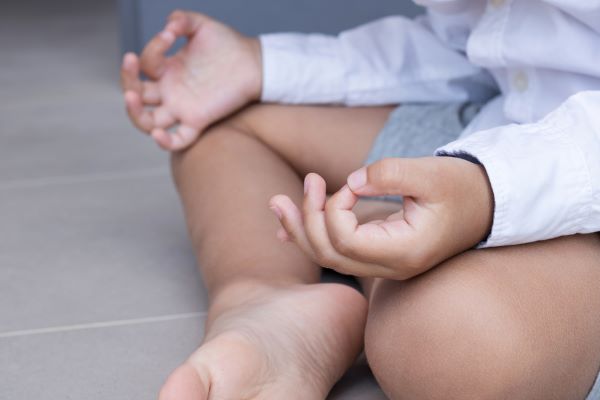
Besides, the psychoeducation emotional that encompasses mindfulness and which must accompany the meditation technique, you can start working before the age of 6, this psychoeducation being highly recommended for any child, so that they grow up knowing how to identify, listen to and correctly use their emotions (which becomes also grow with

